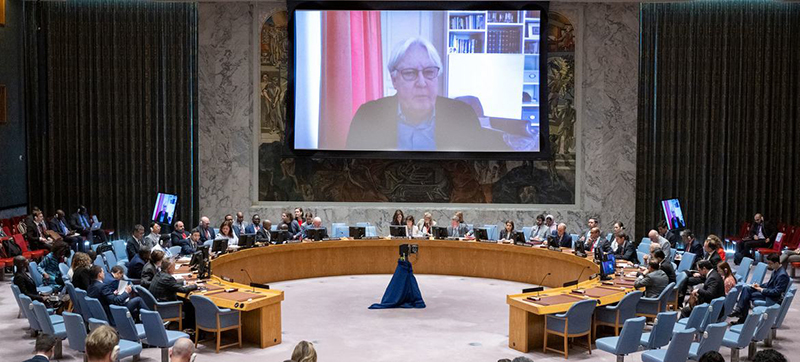Ukraine: Imperative to ‘explore all options’ to reach civilians – UN relief chief

Civilians who are caught up in the crossfire in Ukraine need and deserve humanitarian relief, “wherever the are”, said the UN Humanitarian Affairs chief on Monday, briefing the Security Council, calling for aid workers to be allowed full access, in line with international law.
Emergency Relief Coordinator Martin Griffiths said that it was “imperative that we explore all options to reach civilians”, stressing that all parties to the fighting must allow and facilitate the “rapid and unimpeded passage of humanitarian relief”.
“I urge the parties to strengthen facilitation efforts so we can reach all civilians in need”, he said.
Cut off from food, water, care
He noted that many communities along Ukraine’s northeastern border with Russia and the frontline of fighting, were encircled, without access to water, food and medical care.
“Only last week in Kherson, residential buildings, a school, an outpatient hospital, and an elderly care facility were reportedly damaged, leaving scores of civilians needing shelter and healthcare. And missile strikes in Odesa hit a humanitarian storage warehouse. A Ukrainian Red Cross mobile hospital in Mykolaiv was also hit. Humanitarian supplies and vital medical equipment were destroyed.”
He said no staff or volunteers were injured but the threats persist. Civilians must not be target, he insisted, or the homes, schools, hospitals and buildings, where they live and work.
He stressed again, the need for a political solution, and importance of peace for Ukraine, with civilian casualties during Russia’s continued occupation of parts of the south and east, “rising to their highest levels in months.”
Over 20,000 dead or injured
The UN human rights office, OHCHR, “has now verified a staggering 23,600 civilian casualties since 24 February 2022; we all know the actual toll is likely to be much higher”, said Mr. Griffiths.
Despite the constant dangers, the “sheer bravery of humanitarian workers, particularly local workers”, for the UN and other NGOs, means life-saving assistance continues to be delivered nationwide.
He said nearly 3.6 million people received humanitarian assistance in Ukraine in the first quarter of 2023 with around 43 inter-agency convoys delivering food and vital supplies to some 278,000 people in frontline areas so far this year, “with local partners conducting last-mile delivery and distribution.”
But he said more is needed “to take our efforts to scale. The biggest challenge remains the impediments to reaching all areas in Donetsk, Luhansk, Kherson and Zaporizhzhia currently under the military control of the Russian Federation.”
Full access to these areas “continue to be explored through engagement with both parties.”
‘Recommitment’ to Black Sea Initiative
Food exported under the Black Sea Initiative, together with food and fertilizer exports from Russia, continue to make a crucial contribution to global food security, he told ambassadors.
More than 30 million metric tons of cargo have now been safely exported from Ukrainian ports, of which over 55 per cent has gone to developing countries and close to six per cent, directly to Least Developed Countries.
This includes just under 600,000 metric tons of wheat transported by the World Food Programme (WFP), in direct support of humanitarian operations in Afghanistan, Ethiopia, Kenya, Somalia and Yemen.
Despite the progress and falling food prices since last summer’s highs, “much more remains to be done”.
“Predictable supplies for humanitarian food assistance operations continue to be required. The Initiative refers to the export of ammonia, but this has not yet been possible.
Over the past month, there’s been a major reduction in exports moving through Ukraine’s Black Sea ports, due to what the UN relief chief called “increasingly challenging dynamics” within the Joint Coordination Centre (JCC), run by Russia, Ukraine, the UN and Türkiye, “and a related slowdown in operations.”
He assured that intensive talks “to secure agreement on its extension and the improvements needed for it to operate effectively and predictably”, would continue in the next few days, with UN support continuing for the “Memorandum of Understanding on the facilitation of Russian food and fertilizer exports.”
“For the reasons I have set out, continuation of the Black Sea Initiative is critical, as is recommitment by the parties to its smooth and efficient operation. We call on all parties to meet their responsibilities in this regard.”
“The world is watching”, he underlined.
A war none can afford
He ended telling the Council it was clear that neither the people of Ukraine, or millions around the world who have suffered as a result of the economic chaos and supply chain issues, “can ill afford a continuation of this war.”
Mr. Griffiths called on Security Council member and all nations, to support all efforts to end “the carnage and destruction.”
“In the meantime, the United Nations and its humanitarian partners remain committed to safeguarding the life and dignity of persons affected by the war and to the pursuit of peace – today, tomorrow, and for as long as it takes.”



